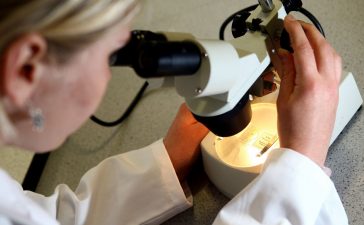American Society of Civil Engineers. Failure to Act: Closing the Infrastructure Investment Gap for America’s Economic Future (American Society of Civil Engineers, 2016).
Koks, E. E. et al. A global multi-hazard risk analysis of road and railway infrastructure assets. Nat. Commun. 10, 1–11 (2019).
Van Aalst, M. K. The impacts of climate change on the risk of natural disasters. Disasters 30, 5–18 (2006).
Mitchell, J. F., Lowe, J., Wood, R. A. & Vellinga, M. Extreme events due to human-induced climate change. Philos. Trans. R. Soc. A: Math., Phys. Eng. Sci. 364, 2117–2133 (2006).
Banholzer, S., Kossin, J. & Donner, S. in Reducing Disaster: Early Warning Systems for Climate Change, 21–49 (Springer, 2014).
Cook, W., Barr, P. J. & Halling, M. W. Bridge failure rate. J. Perform. Constr. Facil. 29, 04014080 (2015).
Van Leeuwen, Z. & Lamb, R. Flood and Scour Related Failure Incidents at Railway Assets Between 1846 and 2013 (Railway Safety & Standards Board, 2014).
Garg, R. K., Chandra, S. & Kumar, A. Analysis of bridge failures in India from 1977 to 2017. Struct. Infrastruct. Eng. 18, 295–312 (2022).
Jeong, Y., Kim, W., Lee, I. & Lee, J. Bridge inspection practices and bridge management programs in China, Japan, Korea, and US. J. Struct. Integr. Maint. 3, 126–135 (2018).
Lynch, J. P. An overview of wireless structural health monitoring for civil structures. Philos. Trans. R. Soc. A: Math., Phys. Eng. Sci. 365, 345–372 (2007).
Farrar, C. R. & Worden, K. Structural Health Monitoring: A Machine Learning Perspective (John Wiley & Sons, 2012).
Sanayei, M., Khaloo, A., Gul, M. & Catbas, F. N. Automated finite element model updating of a scale bridge model using measured static and modal test data. Eng. Struct. 102, 66–79 (2015).
Khaloo, A., Lattanzi, D., Cunningham, K., Dell’Andrea, R. & Riley, M. Unmanned aerial vehicle inspection of the placer river trail bridge through image-based 3d modelling. Struct. Infrastruct. Eng. 14, 124–136 (2018).
Momtaz Dargahi, M., Khaloo, A. & Lattanzi, D. Color-space analytics for damage detection in 3d point clouds. Struct. Infrastruct. Eng. 18, 775–788 (2022).
Lin, C. & Yang, Y. Use of a passing vehicle to scan the fundamental bridge frequencies: an experimental verification. Eng. Struct. 27, 1865–1878 (2005).
Feng, M., Fukuda, Y., Mizuta, M. & Ozer, E. Citizen sensors for SHM: use of accelerometer data from smartphones. Sensors 15, 2980–2998 (2015).
Yang, Y.-B., Lin, C. & Yau, J. Extracting bridge frequencies from the dynamic response of a passing vehicle. J. Sound Vib. 272, 471–493 (2004).
Yang, Y. & Chang, K. Extracting the bridge frequencies indirectly from a passing vehicle: parametric study. Eng. Struct. 31, 2448–2459 (2009).
Siringoringo, D. M. & Fujino, Y. Estimating bridge fundamental frequency from vibration response of instrumented passing vehicle: analytical and experimental study. Adv. Struct. Eng. 15, 417–433 (2012).
Zhang, Y., Wang, L. & Xiang, Z. Damage detection by mode shape squares extracted from a passing vehicle. J. Sound Vib. 331, 291–307 (2012).
Yang, Y.-B., Yang, J. P., Zhang, B. & Wu, Y. Vehicle Scanning Method for Bridges (Wiley Online Library, 2020).
Sitton, J. D., Rajan, D. & Story, B. A. Bridge frequency estimation strategies using smartphones. J. Civ. Struct. Health Monit. 10, 513–526 (2020).
Sitton, J. D., Zeinali, Y., Rajan, D. & Story, B. A. Frequency estimation on two-span continuous bridges using dynamic responses of passing vehicles. J. Eng. Mech. 146, 04019115 (2020).
Marulanda, J., Caicedo, J. M. & Thomson, P. Modal identification using mobile sensors under ambient excitation. J. Comput. Civ. Eng. 31, 04016051 (2016).
Matarazzo, T. J. & Pakzad, S. N. Structural identification for mobile sensing with missing observations. J. Eng. Mech. 142, 04016021 (2016).
Matarazzo, T. J. & Pakzad, S. N. Truncated physical model for dynamic sensor networks with applications in high-resolution mobile sensing and bigdata. J. Eng. Mech. 142, 04016019 (2016).
Matarazzo, T. J. & Pakzad, S. N. Scalable structural modal identification using dynamic sensor network data with STRIDEX. Comput.-Aided Civ. Infrastruct. Eng. 33, 4–20 (2018).
Malekjafarian, A. & OBrien, E. J. Identification of bridge mode shapes using short time frequency domain decomposition of the responses measured in a passing vehicle. Eng. Struct. 81, 386–397 (2014).
Ozer, E., Feng, M. Q. & Feng, D. Citizen sensors for SHM: towards a crowdsourcing platform. Sensors 15, 14591–14614 (2015).
Ozer, E., Purasinghe, R. & Feng, M. Q. Multi-output modal identification of landmark suspension bridges with distributed smartphone data: Golden gate bridge. Struct. Control Health Monit. 27, e2576 (2020).
Figueiredo, E., Moldovan, I., Alves, P., Rebelo, H. & Souza, L. Smartphone application for structural health monitoring of bridges. Sensors 22, 8483 (2022).
McGetrick, P., Hester, D. & Taylor, S. Implementation of a drive-by monitoring system for transport infrastructure utilising smartphone technology and GNSS. J. Civ. Struct. Health Monit. 7, 175–189 (2017).
Matarazzo, T. J. et al. Crowdsensing framework for monitoring bridge vibrations using moving smartphones. Proc. IEEE 106, 577–593 (2018).
Eshkevari, S. S., Cronin, L., Matarazzo, T. J. & Pakzad, S. N. Bridge modal property identification based on asynchronous mobile sensing data. Struct. Health Monit. 22, 2022–2037 (2023).
Quqa, S., Giordano, P. F. & Limongelli, M. P. Shared micromobility-driven modal identification of urban bridges. Autom. Constr. 134, 104048 (2022).
Matarazzo, T. J. et al. Crowdsourcing bridge dynamic monitoring with smartphone vehicle trips. Commun. Eng. 1, 29 (2022).
OKeeffe, K. P., Anjomshoaa, A., Strogatz, S. H., Santi, P. & Ratti, C. Quantifying the sensing power of vehicle fleets. Proc. Natl Acad. Sci. USA 116, 12752–12757 (2019).
Askegaard, V. & Mossing, P. Long Term Observation of Rc-bridge Using Changes in Natural Frequency. Nordic Concrete Research. Publication No 7 (Nordic Concrete Federation, 1988).
Peeters, B. & De Roeck, G. One-year monitoring of the Z24-bridge: environmental effects versus damage events. Earthq. Eng. Struct. Dyn. 30, 149–171 (2001).
Peeters, B., Maeck, J. & De Roeck, G. Vibration-based damage detection in civil engineering: excitation sources and temperature effects. Smart Mater. Struct. 10, 518 (2001).
Liang, Y., Li, D., Song, G. & Feng, Q. Frequency co-integration-based damage detection for bridges under the influence of environmental temperature variation. Measurement 125, 163–175 (2018).
Ralbovsky, M., Deix, S. & Flesch, R. Frequency changes in frequency-based damage identification. Struct. Infrastruct. Eng. 6, 611–619 (2010).
Kim, J.-T., Park, J.-H. & Lee, B.-J. Vibration-based damage monitoring in model plate-girder bridges under uncertain temperature conditions. Eng. Struct. 29, 1354–1365 (2007).
Jin, C., Jang, S., Sun, X., Li, J. & Christenson, R. Damage detection of a highway bridge under severe temperature changes using extended Kalman filter trained neural network. J. Civ. Struct. Health Monit. 6, 545–560 (2016).
Fan, W. & Qiao, P. Vibration-based damage identification methods: a review and comparative study. Struct. Health Monit. 10, 83–111 (2011).
Farrar, C. & James Iii, G. System identification from ambient vibration measurements on a bridge. J. Sound Vib. 205, 1–18 (1997).
Shi, Z., Law, S. & Zhang, L. Damage localization by directly using incomplete mode shapes. J. Eng. Mech. 126, 656–660 (2000).
Lee, J. J., Lee, J. W., Yi, J. H., Yun, C. B. & Jung, H. Y. Neural networks-based damage detection for bridges considering errors in baseline finite element models. J. Sound Vib. 280, 555–578 (2005).
Hu, C. & Afzal, M. T. A statistical algorithm for comparing mode shapes of vibration testing before and after damage in timbers. J. Wood Sci. 52, 348–352 (2006).
OBrien, E. J. & Malekjafarian, A. A mode shape-based damage detection approach using laser measurement from a vehicle crossing a simply supported bridge. Struct. Control Health Monit. 23, 1273–1286 (2016).
Liew, K. M. & Wang, Q. Application of wavelet theory for crack identification in structures. J. Eng. Mech. 124, 152–157 (1998).
Hong, J.-C., Kim, Y., Lee, H. & Lee, Y. Damage detection using the Lipschitz exponent estimated by the wavelet transform: applications to vibration modes of a beam. Int. J. Solids Struct. 39, 1803–1816 (2002).
Douka, E., Loutridis, S. & Trochidis, A. Crack identification in plates using wavelet analysis. J. Sound Vib. 270, 279–295 (2004).
Chang, C.-C. & Chen, L.-W. Detection of the location and size of cracks in the multiple cracked beam by spatial wavelet based approach. Mech. Syst. Signal Process. 19, 139–155 (2005).
Poudel, U. P., Fu, G. & Ye, J. Wavelet transformation of mode shape difference function for structural damage location identification. Earthq. Eng. Struct. Dyn. 36, 1089–1107 (2007).
Tan, C., Elhattab, A. & Uddin, N. Wavelet based damage assessment and localization for bridge structures. In 26th ASNT Research Symposium, 228–240 (2017).
Pandey, A., Biswas, M. & Samman, M. Damage detection from changes in curvature mode shapes. J. Sound Vib. 145, 321–332 (1991).
Wahab, M. A. & De Roeck, G. Damage detection in bridges using modal curvatures: application to a real damage scenario. J. Sound Vib. 226, 217–235 (1999).
Kim, B. H., Park, T. & Voyiadjis, G. Z. Damage estimation on beam-like structures using the multi-resolution analysis. Int. J. Solids Struct. 43, 4238–4257 (2006).
Feng, D. & Feng, M. Q. Output-only damage detection using vehicle-induced displacement response and mode shape curvature index. Struct. Control Health Monit. 23, 1088–1107 (2016).
Shokrani, Y., Dertimanis, V. K., Chatzi, E. N. & N. Savoia, M. On the use of mode shape curvatures for damage localization under varying environmental conditions. Struct. Control Health Monit. 25, e2132 (2018).
Allemang, R. J. A correlation coefficient for modal vector analysis. In Proc. 1st Int. Modal Analysis Conference, 110–116 (1982).
Pakzad, S. N. & Fenves, G. L. Statistical analysis of vibration modes of a suspension bridge using spatially dense wireless sensor network. J. Struct. Eng. 135, 863–872 (2009).
Abdel-Ghaffar, A. M. & Scanlan, R. H. Ambient vibration studies of Golden Gate Bridge: I. Suspended structure. J. Eng. Mech. 111, 463–482 (1985).
Çelebi, M. Golden Gate Bridge response: a study with low-amplitude data from three earthquakes. Earthq. Spectra 28, 487–510 (2012).
Malekjafarian, A. & OBrien, E. J. On the use of a passing vehicle for the estimation of bridge mode shapes. J. Sound Vib. 397, 77–91 (2017).
Riasat Azim, M. & Gül, M. Damage detection of steel-truss railway bridges using operational vibration data. J. Struct. Eng. 146, 04020008 (2020).
Gao, Y. & Spencer, B. Damage localization under ambient vibration using changes in flexibility. Earthq. Eng. Eng. Vib. 1, 136–144 (2002).
Killick, R., Fearnhead, P. & Eckley, I. A. Optimal detection of changepoints with a linear computational cost. J. Am. Stat. Assoc. 107, 1590–1598 (2012).
Chen, W.-F. & Duan, L. Handbook of International Bridge Engineering (CRC Press, 2013).
Eshkevari, S. S., Matarazzo, T. J. & Pakzad, S. N. Bridge modal identification using acceleration measurements within moving vehicles. Mech. Syst. Signal Process. 141, 106733 (2020).
Jordan, M. I. & Mitchell, T. M. Machine learning: trends, perspectives, and prospects. Science 349, 255–260 (2015).
Marx, V. The big challenges of big data. Nature 498, 255–260 (2013).
He, K., Zhang, X., Ren, S. & Sun, J. Deep residual learning for image recognition. In Proceedings of the IEEE Conference on Computer Vision and Pattern Recognition, 770–778 (2016).
Brunton, S. L., Proctor, J. L. & Kutz, J. N. Discovering governing equations from data by sparse identification of nonlinear dynamical systems. Proc. Natl Acad. Sci. USA 113, 3932–3937 (2016).
Spencer Jr, B. F., Hoskere, V. & Narazaki, Y. Advances in computer vision-based civil infrastructure inspection and monitoring. Engineering 5, 199–222 (2019).
Khaloo, A., Lattanzi, D., Jachimowicz, A. & Devaney, C. Utilizing UAV and 3D computer vision for visual inspection of a large gravity dam. Front. Built Environ. 4, 31 (2018).
Rafiei, M. H. & Adeli, H. A novel unsupervised deep learning model for global and local health condition assessment of structures. Eng. Struct. 156, 598–607 (2018).
Smith, I. F. Studies of sensor data interpretation for asset management of the built environment. Front. Built Environ. 2, 8 (2016).
Malekjafarian, A., Golpayegani, F., Moloney, C. & Clarke, S. A machine learning approach to bridge-damage detection using responses measured on a passing vehicle. Sensors 19, 4035 (2019).
Liu, J. et al. Damage-sensitive and domain-invariant feature extraction for vehicle-vibration-based bridge health monitoring. In ICASSP 2020-2020 IEEE International Conference on Acoustics, Speech and Signal Processing (ICASSP), 3007–3011 (IEEE, 2020).
Feng, B. T., Ogren, A. C., Daraio, C. & Bouman, K. L. Visual vibration tomography: Estimating interior material properties from monocular video. In Proceedings of the IEEE/CVF Conference on Computer Vision and Pattern Recognition, 16231–16240 (2022).
Guo, K. & Buehler, M. J. A semi-supervised approach to architected materials design using graph neural networks. Extrem. Mech. Lett. 41, 101029 (2020).
Nadkarni, N., Daraio, C. & Kochmann, D. M. Dynamics of periodic mechanical structures containing bistable elastic elements: from elastic to solitary wave propagation. Phys. Rev. E 90, 023204 (2014).
Chang, K.-C. & Kim, C.-W. Modal-parameter identification and vibration-based damage detection of a damaged steel truss bridge. Eng. Struct. 122, 156–173 (2016).
Sadeghi Eshkevari, S., Matarazzo, T. J. & Pakzad, S. N. Simplified vehicle–bridge interaction for medium to long-span bridges subject to random traffic load. J. Civ. Struct. Health Monit. 10, 693–707 (2020).
Cronin, L. et al. Commodifying Infrastructure Spatial Dynamics with Crowdsourced Smartphone Data (2024).
Dickey, D. A. & Fuller, W. A. Distribution of the estimators for autoregressive time series with a unit root. J. Am. Stat. Assoc. 74, 427–431 (1979).











